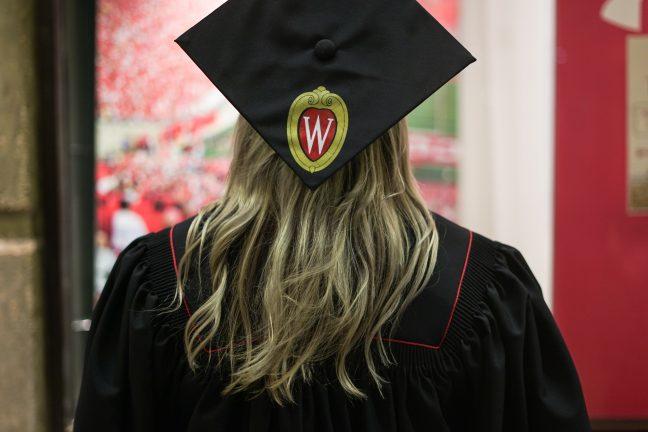Despite the University of Wisconsin’s rising four- and six-year graduation rates, completing a bachelor’s degree in that time span can be difficult.
According to The Hechinger Report, colleges and government bodies tend to count successful institutional graduate rates over six- or eight-year spans. Nevertheless, many colleges claim their goal is to have high four-year graduation rates.
President of Complete College America — a non-profit organization that advocates for educational policy change — Yolanda Watson Spiva said counting graduation success rates in six- or eight-year spans gives colleges less incentive to help students graduate within four years.
According to The Hechinger Report, this makes college graduation difficult for low income students —Extending the time a student is in school means higher tuition payments and a delayed beginning to their career.
According to The Hechinger Report, 90% of incoming students nationwide are confident they will graduate within four years. The actual number of students graduating within that timespan is less than half.
Spiva said there are barriers that make completing college within four years difficult.
Moving on: Blank reflects on challenges of her chancellorship and where UW goes from here
“A lot of colleges have a traditional Monday through Friday schedule, with no classes in the evening and no classes on the weekend,” Spiva said.
Spiva said that for students who don’t have affordability issues, family commitments or poor pre-college education, it can be easy to graduate following this rigid schedule. These same wealthy people control universities Spiva said.
“When you talk about students who have other challenges as well, we’ve got to find a way to not use an antiquated system, and overlay it with students who have complex lives,” Spiva said.
Spiva said there is an unwillingness among many university leaders to change practices to procure federal funding because they aren’t forced to improve graduation rates.
“Even if it doesn’t change today, there should be some demonstrated evidence that the institution is trying to make changes,” Spiva said.
UW receives $20 million donation for new Letters and Sciences building
But, The Hechinger Report said government policies that count successful rates beyond four years mostly protect small, poorly performing institutions. Many nationally prominent universities are successful at improving their short term rates and assisting students who attend beyond four years.
For instance, according to Wisconsin Public Radio, six-year graduation rates at UW reached an all time high in 2021.
According to WPR, UW Provost Karl Scholz said good advising resources make it easier for students to navigate academic requirements.
UW sends out campus climate survey to understand student experiences based on identities, background
Fifth-year UW student Isabelle Cook said she is majoring in Russian, history, economics and international studies. However, she started out just majoring in Russian and history.
“I decided I should probably refine my quantitative skills, so I picked up the econ major,” Cook said. “It was at that point that I committed to doing five years.”
Cook added her international relations major this past month because it only requires a few more classes.
Cook said the financial aid office has been extremely helpful, and that they extended her scholarship to help her complete her required courses.
But, Cook said the economics department made it difficult for her to declare her economics major. A long list of prerequisites, a waiting period for a declaration seminar and a lack of advisors were major barriers.
“I guess the problem is really that the professors don’t have a lot of help,” Cook said. “Econ is the biggest major on campus, which means there are tons of students and not enough advisors.”
Cook said people often make assumptions about fifth-year students. Specifically, people question why people take longer than average to complete college.
Average time to graduate varies by major at UW. For instance, agricultural and applied economics majors complete their degree within 3.53 years on average. Chemical engineering and botany majors take about a full year longer, according to the Office of the Provost.
Unlike many other colleges, where students have taken longer to graduate over time, data from the Office of the Provost shows that average time-to-degree has fallen for undergrads in the past decade.


















